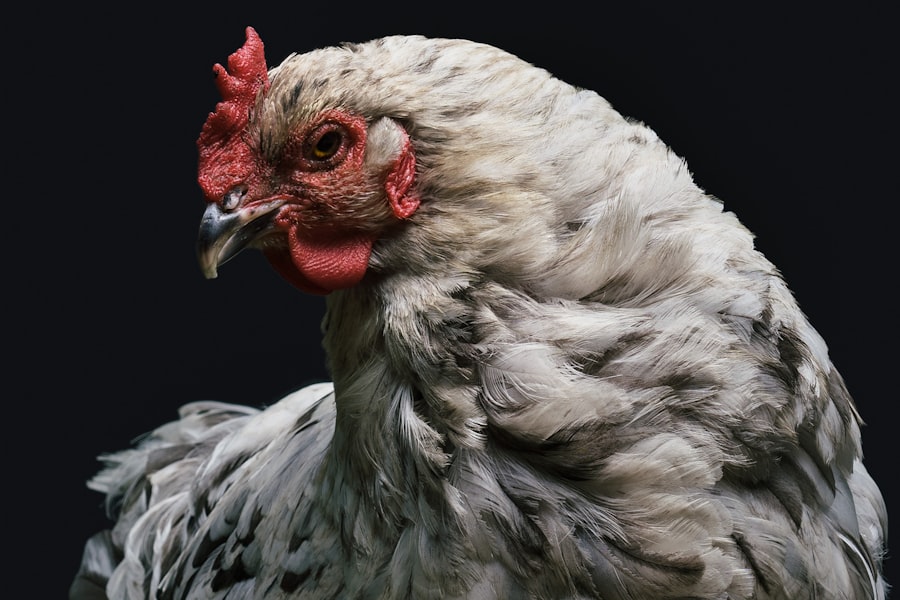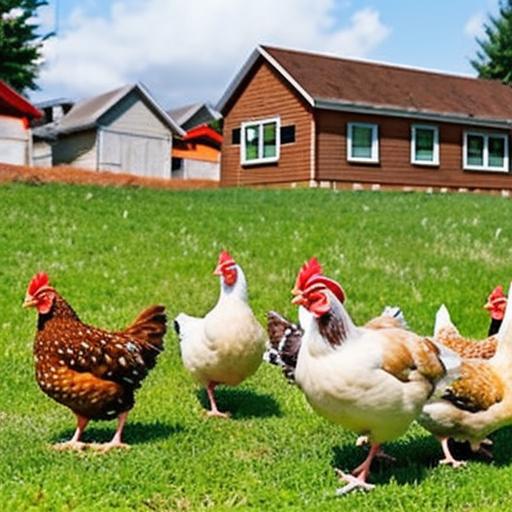Keeping chickens in a residential area has become increasingly popular in recent years. Not only do chickens provide fresh eggs, but they also offer natural pest control and can be a fun and educational experience for the whole family. However, before diving into the world of backyard chickens, it is important to understand the local regulations and requirements for keeping them in a residential area. By following these regulations, you can avoid fines or legal issues and ensure a positive experience for both you and your neighbors.
Key Takeaways
- Understanding local regulations is crucial before keeping chickens in a residential area.
- Chickens require adequate space for their well-being and productivity.
- Choosing the right chicken coop is important for the safety and comfort of the birds.
- Factors such as noise, odor, and predators should be considered before keeping chickens in a residential area.
- Proper ventilation in the coop is essential for the health of the chickens and to prevent respiratory issues.
Understanding Local Regulations
Before bringing chickens into your backyard, it is crucial to research and understand the local regulations regarding keeping chickens in a residential area. These regulations can vary greatly depending on where you live, so it is important to do your due diligence. Some cities may have specific zoning laws or restrictions on the number of chickens allowed, while others may require permits or inspections.
By following these regulations, you can avoid fines or legal issues that may arise from non-compliance. Additionally, adhering to these regulations shows respect for your neighbors and helps maintain a positive relationship with them. It is always a good idea to communicate with your neighbors about your plans to keep chickens and address any concerns they may have.
Space Requirements for Chickens
When keeping chickens in a residential area, it is important to provide them with enough space to move around and exercise. The minimum space requirements for chickens can vary depending on the breed and the number of chickens you plan to keep. As a general rule of thumb, each chicken should have at least 4 square feet of coop space and 10 square feet of outdoor space.
Providing adequate space for your chickens not only ensures their physical well-being but also helps prevent behavioral issues that can arise from overcrowding. Chickens that are cramped or confined to small spaces may become stressed or aggressive towards each other. By providing enough space, you can promote a healthy and harmonious environment for your chickens.
Choosing the Right Chicken Coop
Choosing the right chicken coop is essential for the well-being of your chickens and the success of your backyard flock. There are several types of chicken coops available, including traditional wooden coops, mobile coops, and converted sheds or structures. When selecting a coop, it is important to consider the number of chickens you plan to keep and the available space in your backyard.
The coop should provide enough space for the chickens to roost, nest, and move around comfortably. It should also have proper ventilation to prevent moisture buildup and ensure good air quality. Additionally, the coop should be secure and predator-proof to protect your chickens from potential threats.
Factors to Consider Before Keeping Chickens
Before deciding to keep chickens in a residential area, there are several factors that should be considered. One common concern is noise. While chickens are generally not as noisy as other pets, they do make sounds such as clucking and crowing. If noise is a concern, it is important to choose breeds that are known for being quieter, such as Silkies or Sussex.
Another concern is odor. Proper coop maintenance and waste management can help minimize odors associated with keeping chickens. Regularly cleaning the coop and managing chicken waste can go a long way in preventing unpleasant smells. Additionally, locating the coop away from neighboring properties can help mitigate any potential odor issues.
Importance of Proper Ventilation in the Coop

Proper ventilation is crucial for the health and well-being of your chickens. Good ventilation helps remove moisture, ammonia, and other gases from the coop, which can lead to respiratory issues if not properly managed. It also helps regulate temperature and prevent heat stress during hot weather.
To ensure adequate ventilation in the coop, it is important to have windows or vents that can be opened and closed as needed. These openings should be positioned to allow for cross-ventilation and should be protected with wire mesh to prevent predators from entering. Regularly cleaning the coop and removing any bedding or waste that may obstruct airflow is also important for maintaining good ventilation.
Feeding and Watering Chickens in a Residential Area
Feeding and watering chickens in a residential area can be relatively simple. Chickens require a balanced diet that includes a combination of commercial feed, kitchen scraps, and foraging opportunities. There are different types of feed available, including pellets, crumbles, and mash, so it is important to choose the right type for your chickens.
In addition to feed, chickens also require access to fresh water at all times. There are various water options available, including traditional waterers, nipple drinkers, and automatic waterers. It is important to regularly clean and refill the water containers to ensure clean and fresh water for your chickens.
Common Health Issues to Watch Out for in Chickens
Like any other animal, chickens can face health issues from time to time. It is important to be aware of common health issues that chickens may experience and take appropriate measures to prevent and treat them. Some common health issues in chickens include respiratory infections, parasites, and egg-laying problems.
Prevention is key when it comes to chicken health. Providing a clean and well-ventilated coop, practicing good biosecurity measures, and offering a balanced diet can help prevent many health issues. Regularly inspecting your chickens for signs of illness or injury and seeking veterinary care when necessary is also important for maintaining their overall health.
Managing Chicken Waste in a Residential Area
Proper management of chicken waste is essential when keeping chickens in a residential area. Chicken manure can be a valuable source of nutrients for your garden or compost pile, but it must be managed properly to prevent odor issues and potential contamination of water sources.
One option for managing chicken waste is composting. Composting chicken manure can help break down the waste and turn it into a nutrient-rich soil amendment. It is important to follow proper composting guidelines and ensure that the compost reaches a high enough temperature to kill any potential pathogens.
If composting is not an option, chicken waste can be disposed of in a responsible manner. Bagging the waste and placing it in the trash or contacting local agricultural organizations or farms that may be interested in using it as fertilizer are alternative options.
Enjoying the Benefits of Keeping Chickens in a Residential Area
Keeping chickens in a residential area can be a rewarding experience that offers numerous benefits. From fresh eggs to natural pest control, chickens can provide a sustainable and enjoyable addition to your backyard. By understanding and following local regulations, providing adequate space and ventilation, and properly managing waste, you can create a healthy and harmonious environment for your chickens.
If you are considering keeping chickens, it is important to do your research and gather as much information as possible. There are many resources available online, including websites, forums, and books, that can provide valuable information on all aspects of keeping chickens. Additionally, reaching out to local chicken-keeping communities or organizations can provide you with firsthand knowledge and support as you embark on your backyard chicken journey.
If you’re wondering how many chickens you can keep in a residential area, you’ll definitely want to check out this informative article on Poultry Wizard. They provide valuable insights on what kind of coop is best for chickens, including tips on creating a farmhouse chicken coop. Understanding the right coop setup is crucial when determining the number of chickens you can comfortably accommodate in your backyard. To learn more, click here: https://poultrywizard.com/keeping-chickens/what-kind-of-coop-is-best-for-chickens/.
FAQs
What is the maximum number of chickens allowed in a residential area?
The maximum number of chickens allowed in a residential area varies depending on the local zoning laws and regulations. Some areas may not allow any chickens, while others may allow a certain number based on the size of the property.
What are the common restrictions on keeping chickens in a residential area?
Common restrictions on keeping chickens in a residential area include limits on the number of chickens, requirements for coop size and placement, and regulations on noise and odor.
Do I need a permit to keep chickens in a residential area?
In some areas, a permit may be required to keep chickens in a residential area. It is important to check with local authorities to determine if a permit is necessary.
What are the benefits of keeping chickens in a residential area?
Keeping chickens in a residential area can provide a source of fresh eggs, natural pest control, and fertilizer for gardens. It can also be a fun and educational hobby for families.
What are the potential drawbacks of keeping chickens in a residential area?
Potential drawbacks of keeping chickens in a residential area include noise and odor, potential for attracting predators, and the responsibility of caring for the chickens on a daily basis.
What should I consider before keeping chickens in a residential area?
Before keeping chickens in a residential area, it is important to consider local zoning laws and regulations, the amount of space available for the chickens, and the time and resources required to care for them properly. It is also important to consider the potential impact on neighbors and the surrounding environment.
Meet Walter, the feathered-friend fanatic of Florida! Nestled in the sunshine state, Walter struts through life with his feathered companions, clucking his way to happiness. With a coop that’s fancier than a five-star hotel, he’s the Don Juan of the chicken world. When he’s not teaching his hens to do the cha-cha, you’ll find him in a heated debate with his prized rooster, Sir Clucks-a-Lot. Walter’s poultry passion is no yolk; he’s the sunny-side-up guy you never knew you needed in your flock of friends!







